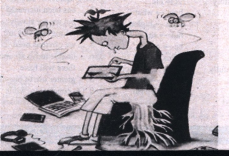题目内容
Every August my family sets out on a road trip. And we always head north. Canada may not be the most exciting of destinations,but we 1.(attract) by its familiarity,cool weather and,most of all,niceness.
We experience Canadian niceness as soon as we! reach customs. The US border guards are 2.(friendly) and all business. The Canadians,on 3. contrary,are unfailingly polite,even as they question us 4. the number of wine bottles we’ re bringing into the country. One year,we had failed 5. (notice) that our 9-year-old daughter’s passport was out of date. They,nicely,let us enter anyway. The niceness continues for our entire trip,as we meet nice 6. (waiter) , nice hotel clerks,nice strangers.
Life is hard enough. Why not coat it with politeness? Politeness,at its best,is a way of 7. (honour) others,especially strangers.Politeness makes social interactions run 8.(smooth) and reduces the risk of conflicts. The world,I think,would be a better place if we 9.(be) all a bit more Canadian. Fortunately,Canadian niceness is contagious (有感染力的) . On my annual northern trip,I find 10. (I) slowing down,saying “thank you” and “please” more often than I usually do.
1. are attracted。考查一般现在时的被 动语态。we与attract之间是被动关 系,且从全文时、态可知应填are attracted 。
2. unfriendly。考查形容词作表语的用 法。设全处作表语且由all business 可知设空处意为“不友好的”,故填 unfriendly。
3. the。考查定冠词。on. the contrary 意为“正相反”。
4. about。考查介词。question sb. about sth.意为“询问某人某事”。
5. to notice。考查不定式作宾语的用 法。fail后需跟不定式作宾语,故填 to notice。
6. waiters。考查名词。设空处前有 nice 修饰,且与 hotel clerks 和 strangers 并列,故填 waiters。
7. honouring。考查动词-ing形式作宾 语的用法。介词后需跟动词-ing形 式作宾语,故填honouring。
8. snoothly。考査副词。设空处修饰 动词 run ,故填 smoothly。
9. were。考查虚拟语气。由would be 可知,这是一个与现在事实相反的 虚拟条件句,故条件从句中用were。
10. myself。考查代词。主语与宾语指 的是同一个人,故填myself。

